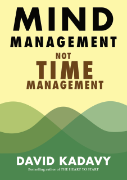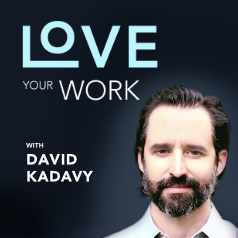Subscribe to blog updates via email »
Understanding Media (by Marshall McLuhan) Book Summary – Love Your Work, Episode 248
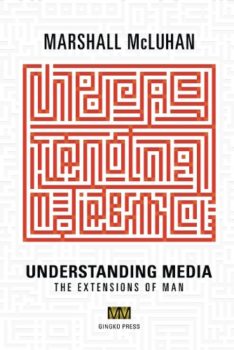 You’ve heard the expression, “The medium is the message.” But what does that really mean? “The medium is the message” is a term coined by Marshall McLuhan in his book, Understanding Media: Extensions of Man. More than fifty years after it was published – in 1964 – Understanding Media reads as if it’s from the future. In this Understanding Media summary, I’ll break down – in my own words – why “The medium is the message,” as well as other key ideas within this, one of the best media studies books.
You’ve heard the expression, “The medium is the message.” But what does that really mean? “The medium is the message” is a term coined by Marshall McLuhan in his book, Understanding Media: Extensions of Man. More than fifty years after it was published – in 1964 – Understanding Media reads as if it’s from the future. In this Understanding Media summary, I’ll break down – in my own words – why “The medium is the message,” as well as other key ideas within this, one of the best media studies books.
Want to read this summary on your favorite ereader? Download it here »
Listen to this Understanding Media summary

WANT TO WRITE A BOOK?
Download your FREE copy of How to Write a Book »
(for a limited time)
- Listen in iTunes >>
- Download as an MP3 by right-clicking here and choosing “save as.”
- RSS feed for Love Your Work
Three key ideas in Understanding Media
I’m going to cover three key ideas in this summary:
- The medium is the message. Basically, it’s not the content of the medium that matters. Instead, the characteristics of that medium determine its content.
- We’re shifting from mechanical technology to electric technology. Mechanical technology such as wheels, roads, and the printing press influence us in different ways from electric technology such as the lightbulb, television, or – today – the internet.
- Mechanical technology detribalized humans. Now electric technology is retribalizing humans. This shift causes stress in the ways we interact with one another. Our lack of awareness of how technology changes the way we interact is a threat to civilization.
McLuhan weaves these and other ideas throughout the book as he analyzes things you might normally think of as media – such as radio, television, and books – but also things you might normally not think of as media – such as roads, clothes, money, and clocks.
Now, each of those three main ideas, in more detail:
1. The medium is the message
What does “The medium is the message” mean? McLuhan says:
The medium is the message. This is merely to say that the personal and social consequences of any medium – that is, of any extension of ourselves – results from the new scale that is introduced into our affairs by each extension of ourselves, or by any new technology.
Media are extensions of ourselves
Let me break down some ideas within this quote. First, McLuhan refers to media as “extensions of ourselves.” Remember, the subtitle of the book is Extensions of Man. McLuhan casts a wide net in what he thinks of as media. To McLuhan, media is anything that extends our capabilities as humans. As he says, “Any extension, whether of skin, hand, or foot, affects the psychic and social complex.” In other words, any media extends our capabilities. In the process, it changes how we think, and how we interact with one another.
Media changes our “sense ratios”
How does media change how we think and interact – the “psychic and social complex?” In the quote I presented earlier, McLuhan also talks about “the new scale that is introduced into our affairs,” by these extensions of ourselves.
Every medium alters what McLuhan calls “sense ratios.” We read a book with our eyes and our mind. We watch television with our eyes and our ears. The content of the medium comes to us through specific senses (sight, sound, touch, thought, etc.). As those senses are engaged, it affects how we use our other senses.
I’ve referred to this before, myself, giving an example of a chimp fishing ants out of an anthill with a stick. The stick is an extension of her hand. While she’s holding that stick, she can’t use that hand for some other purpose, such as to defend herself from an attack by another chimp. Even if she could, she might not notice the attack, since she’s focused mentally on the stick, and whether or not it has ants on it.
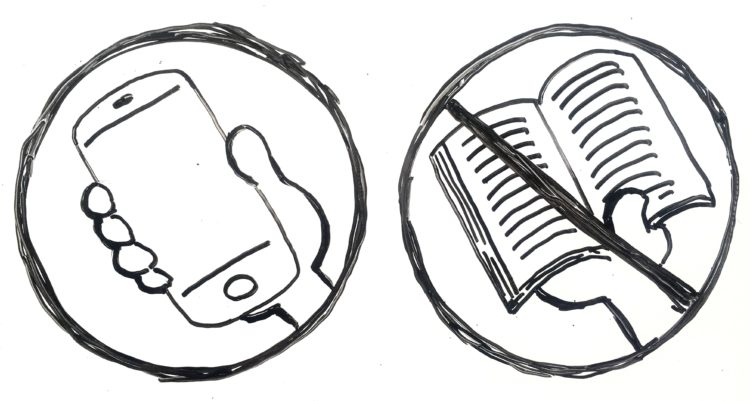
So as a medium makes one thing easy, it makes other things hard.
If you are reading this summary, you’re using different senses than if you are listening to it. That changes how you interact with this summary. If you’re reading, you can easily re-read parts. If you’re listening, it’s less likely you’ll rewind to re-listen to parts.
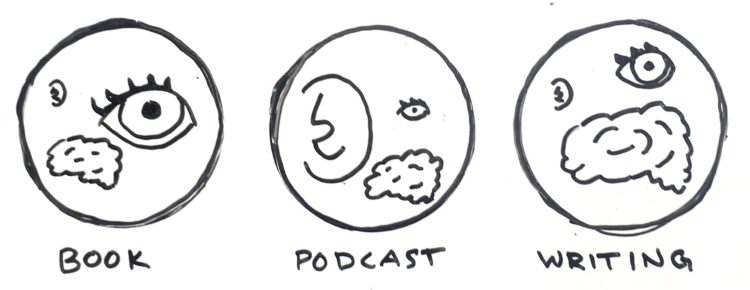
If you’re reading on a laptop or a phone or an ebook reader, each of these devices will also change how you engage with the content. Reading on an ebook reader while lying alone on your couch is different than listening on a subway surrounded by people, or listening on a bluetooth speaker while cooking dinner.
The medium itself alters the content
A really subtle part of McLuhan’s basic description is that “personal and social consequences of any medium…[result]” from this altering of sense ratios.
In other words, the characteristics of the medium cause personal and social consequences. What’s subtly implied here is that the content we’re so often concerned about – violence in video games, for example – is really caused by the medium itself.
As I write this summary, I’m thinking about what medium you’ll use to consume it. That’s changing the decisions I make. I know you might listen to it instead of read it, so I use shorter sentences. I may even be repetitive.
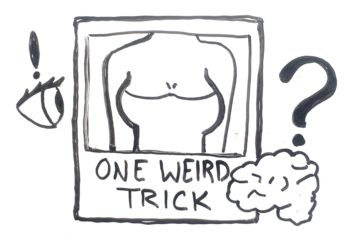
I know if you find this summary through a search engine, you’ll be in a hurry. I know that search engines will rank my article based upon signals that suggest whether or not it was helpful for you. For these reasons, I’m trying to break up the article, so you can skim it in a hurry.
McLuhan doesn’t say this specifically, but any medium is Darwinian in nature. Only organisms suited for their environment survive. Only messages suited for the environment created by their medium survive. The medium is the message.
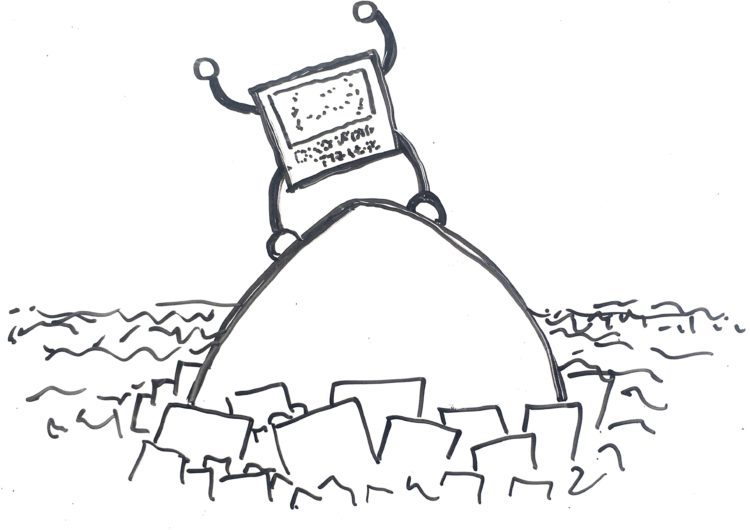
Media have social consequences
So media extends our capabilities, alters our sense ratios, and shapes the messages within the media themselves. This has social consequences.
Here’s some examples of how media affects society, from today’s world:
- Road rage: It is easier to yell at someone in another car while you’re speeding away in your car than it is to say the same thing in an aisle in the grocery store. You get road rage.
- Porn addiction: It is easier to look up porn on the internet to satisfy any sexual fantasy you might have than it is to deal with actual human relationships that normally surround sex. You get porn addiction.
- Fake news: It is easier to share on Facebook an article you agree with, but that isn’t true, than it is to stop and study the article to consider whether it is true. Additionally, the attention that message gets makes Facebook money. So as more people share the article, it further fuels the message. You get fake news.
Yes, every new medium has brought about new and strange behaviors people criticize. Yes, those behaviors are often a re-invention of existing behaviors. But that’s the point McLuhan is making – the characteristics of a medium change the message. That in turn heightens and dampens various aspects of our behavior. To be unaware of how media changes us is a threat to civilization. More on that later.
2. We’re shifting from mechanical technology to electric technology
Mechanical technology alters our “sense ratios” in different ways from electric technology. The same way cogs on a gear have to be cut and sized to fit together, mechanical technology forces us to compartmentalize things in a way that allows mechanical technology to work. (Kind of like Nassim Taleb’s “Platonification” that I talked about in my The Black Swan book summary on episode 244.)
Mechanical technology: the alphabet
A very basic mechanical technology is the alphabet. We’ve broken language into twenty-six characters we can arrange to make words that represent our thoughts. Before written language, we had to physically be in front of someone to communicate with them through spoken word. The language we speak itself is mechanical. It’s a mechanization of our thoughts.
Until relatively recently, if we wanted to transport information – something as simple as “hey, let’s have dinner tonight” – we had to do so physically. McLuhan says the Roman Empire was able to govern because they distributed documents written on papyrus. They developed roads – a mechanical technology – primarily so they could physically move information throughout the empire. This enabled them to rule a massive area of land. Thanks to mechanical technology, Rome built a centralized government.
When Rome lost control of Egypt, they no longer had access to papyrus, so they could no longer distribute information. Europe decentralized – it fragmented into feudalism. It wasn’t until Europe adopted paper-making methods from China that information could flow freely again and Europe could condense into larger states.
Electric technology: the telegraph
An example of an electric technology is the telegraph. Remember, before the telegraph was developed in the 1800s, you had to physically – or mechanically – move information from one place to another. With the telegraph, suddenly information that used to take weeks to reach its destination now took minutes.
This information flow has accelerated, and now we have the internet. When I was growing up in a cul-de-sac in Nebraska in the 90s, my life changed when I started using the internet. I previously lived in a mechanical world: I could only be friends with kids who lived in my neighborhood, regardless of whether we had the same interests. Suddenly, I lived in an electric world: I could now be friends with anyone, anywhere.
Now I can live in Colombia and publish my words to the whole world. But with this lifestyle that’s made possible by electric technology, I run into conflicts with the remnants of mechanical technology. The very concept of a country where I spend a different currency and where I need permission to stay is a result of mechanical technology. Centralized governments like the Romans built are mechanical. They organize people and land through physical means.
Electric technology is an extension of the nervous system
Remember, media is an extension of our capabilities. The wheel – a mechanical technology – is an extension of the foot. Instead of walking wherever you like, the wheel lets you go faster, but you need roads on which to travel.
McLuhan says electric technology is an extension of our nervous system. In the book, McLuhan essentially predicts Google Maps: he says existing technologies – including cities – will become information systems.
When we have instant access to information all throughout the world, we “feel” that information just as we might feel a fluffy kitten or a hot stove.
3. Mechanical technology detribalized humans. Now electric technology is retribalizing humans.
As we use electric technology to overcome physical stress – such as carrying a letter over oceans and mountain ranges – that creates psychic stress. Thanks to electric technology, communication sped up so that we could communicate across the world. That created physical stress of doing commerce from far away. So many of us moved, creating psychic stress of being away from friends and family.
Another form of psychic stress caused by electric technology comes in the form of our simultaneous awareness of everything happening in the world at all times. More on that in a bit, but first, a story about how mechanical technology detribalizes.
Mechanical technology detribalized humans
McLuhan describes a UNESCO experiment where they installed running water in a village in India. The villagers soon after asked for the pipes to be removed. They said the social life of the village had eroded. Thanks to running water, people were staying in their homes. They were no longer gathering at the communal well, so they were no longer chatting and maintaining relationships.
Before running water, the village was more tribal. The running water detribalized the village. It compartmentalized a very important function in their lives – that of getting water. It did that through the mechanical technology of pipes. It was more convenient, but by altering the “sense ratios” involved in getting water, it extracted that act from the social ritual that once surrounded it.
Electric technology is retribalizing humans
In a purely physical world, people tend to organize into small tribes or villages. Instead of being compartmentalized and specialized, there are deep interconnections in relationships and functions. Instead of just selling shoes, the cobbler makes them, too. The smaller the group of people, the more every death and birth and prayer is experienced together – shared by everyone in the tribe.
As electric technology has more influence, we’re increasingly retribalized. As McLuhan describes it, mechanical technology explodes, while electric technology implodes. The extension of our nervous system created by electric technology has made us more aware of how our local actions have effects on a global scale. Understanding Media, by the way, is where Marshall McLuhan coined the term, “global village.”
The conflict between the mechanical and the electric
When you realize we are shifting from detribalized to retribalized as electric technology takes place of mechanical technology, the world starts to make sense.
Here are things we’re seeing as the mechanical is replaced by the electric:
- We’re shifting from industrialized food to organic food. Mechanical technology helped us increase crop yields and build reliable distribution of food. Electric technology is making us aware of where our food comes from, and the impact our food choices have on a global scale. We’re seeing a re-wilding of diets, as we introduce more biodiversity beyond the staples of corn, wheat, orange juice, and pork bellies. As people interpret this flood of information, different diets are springing up – like different “tribes” – such as keto, paleo, carnivore, pescatarian, vegetarian, vegan, and on and on.
- Drugs are being legalized. The state control over what people put in their bodies is mechanical, as was the scare tactics and misinformation that helped reinforce that control. As more people are learning the truth about mostly harmless drugs such as marijuana, these drugs are becoming decriminalized and legalized.
- Time is being reconsidered. Our linear conception of time is a relic of a mechanical world. Time has allowed us to increase output by breaking processes into steps, and allowing the coordination of those steps amongst people and organizations. But as electric technology is allowing free information flow, and automation is making “work” obsolete, creativity is becoming more important. As I’ve talked about in Mind Management, Not Time Management creative output is de-coupled from our linear conception of time.
Next time you’re puzzled by the state of the world, try this: Ask yourself, Is it a conflict between mechnical and electric technology? You can see it in the questioning of whether a police force is the right way to restore order in society, in the gendered bathroom debate, in Russia’s media manipulation in American society, and in the rise of Bitcoin.
We need to understand media for civilization to survive
McLuhan sees our lack of awareness of how media affects us as a threat to civilization. From the book:
The threat of Stalin or Hitler was external. The electric technology is within the gates and we are numb, deaf, blind and mute about its encounter with the Gutenberg technology, on and through which the American way of life was formed. It is, however, no time to suggest strategies when the threat has not even been acknowledged to exist.
Yes, McLuhan compares the effects of electric technology to Hitler. He warns that it’s foolish to think of technology as “neither good nor bad.” The solution, he says is to start by being aware that the very nature of media alters our behavior in the first place.
He reminds us that we misunderstand the Greek Myth of Narcissus. Narcissus saw his reflection in the river, and stared at it longingly until he withered away. We think of narcissism as an obsession with oneself. McLuhan reminds us there is something missing from our modern understanding of the myth of Narcissus: That Narcissus didn’t know he was looking at himself.

Narcissus’s name comes from the Greek word for “narcotic.” As media takes over our senses, it numbs us – like a narcotic – from the true effect it’s having.
One last quote from McLuhan:
It is not an exaggeration to say that the future of modern society and the stability of its inner life depend in large part on the maintenance of an equilibrium between the strength of the techniques of communication and the capacity of the individual’s own reaction.
In other words, we need to become aware of how media affects us. That’s what Understanding Media helps us do.
Honorable mention: “hot” and “cool” media, and “learning a living”
There are many other compelling ideas in this book. One of the most famous being McLuhan’s description of “hot” and “cool” media – “hot” media being media that directly takes over one particular sense, and “cool” media being media that invites your participation.
Another juicy idea was the chapter on “learning a living.” Basically saying that the mere idea of “work” is a product of mechanical technology, and that we’re increasingly finding our work to come in the form of continuously learning.
There’s your Understanding Media summary
I could write entire articles on either of those ideas, but for now I hope you enjoyed that summary. Understanding Media is a very long and complex book – I broke down 25,000 words worth of highlights – a novella’s worth – to write this summary. It’s the most eye-opening book I’ve read in more than a decade. I highly recommend it.
Listen to the Podcast
- Listen in iTunes >>
- Download as an MP3 by right-clicking here and choosing “save as.”
- RSS feed for Love Your Work
Mind Management, Not Time Management now available!
After nearly a decade of work, Mind Management, Not Time Management is now available! This book will show you how to manage your mental energy to be productive when creativity matters. Buy it now!
Our Weekly Newsletter: Love Mondays
Start off each week with a dose of inspiration to help you make it as a creative. Sign up at: kadavy.net/mondays
Thank you for having me on your podcasts!
Thank you for having me on your podcast. I’ve been on quite a few lately. Thank you to Azul Terronez at Authors Who Lead, Pete Mockaitis at Awesome At Your Job, Giuseppe Grammatico at Franchise Freedom, Rui Zhi Dong at The Upgraded Brain, and Todd Henry at The Accidental Creative.
As always, you can see a full list of podcasts I’ve been here.
If you’d like to have me on your podcast, please email me at david at kadavy dot net!
Join the Patreon for (new) bonus content!
I've been adding lots of new content to Patreon. Join the Patreon »
Subscribe to Love Your Work
Theme music: Dorena “At Sea”, from the album About Everything And More. By Arrangement with Deep Elm Records. Listen on Spotify »

